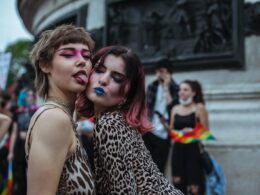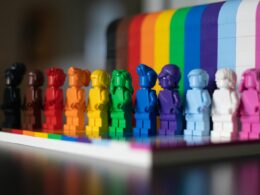For many members of the LGBTQ community, reclaiming gay slurs can be tricky. They often feel conflicted about whether the terms empower or denigrate them.
Dyke and lesbian are associated with different sets of personae (abstract identities or stereotypes). The difference between them is based on three main criteria: masculinity, same-gender sexual desire and radical stance.
Definition
The term dyke is a derogatory word used to refer to women who are attracted to other women. It originated from the 19th-century term bull dyke, which was used to insult women who presented masculine and androgynous characteristics. While the word dyke has a negative connotation, it is reclaimed by many girls-who-like-girls as an empowering label. Some lesbians even go so far as to use the name to describe themselves. Dykes are often seen as a subculture of the queer community and have a rich and unique history.
The reclaiming of the word dyke has not been unanimous. Some LGBTQIA communities feel that it is inappropriate to use this word because it was once used as a slur. Others argue that it is important to reclaim terms that were once offensive and give them new meanings.
The definition of dyke is also disputed, as some people believe that it excludes bisexual women. Others believe that it should be restricted to women who are attracted to men. The San Francisco Dyke March website states that their march recognizes dykes of all kinds, while the Global Dyke Day Facebook page explicitly includes women who are attracted to both men and women as dykes. Some lesbians, especially butch dykes, are known as Ursula or womxn. Some lesbians spell the word with an “x” in order to distance themselves from the sexist “men” in traditional spellings.
Origins
A slur is a word that refers to someone with negative connotations. It is often used to hurt people, especially members of a particular community or group. Some slurs are considered to be more offensive than others. The term dyke is considered to be one of the most offensive lesbian slurs. Its origin is unclear, but it is believed to have been used as early as the 1920s. It was often used to describe women who acted masculine or butch. The word dyke was also used to refer to gay men who acted effeminate or to those who dressed in feminine clothing.
In recent times, the word has been reclaimed by many lesbians as a way to define their sexual orientation. It is now widely accepted as a positive term. Some lesbians prefer to use the term dyke to identify themselves and may refuse to be called a “gay woman” or a “gay man”.
However, the term should not be used by people who do not belong to the LGBTQIA+ community. Using the term dyke can cause offense and lead to discrimination. The slur can also be used as an insult by people who do not understand the meaning of the word. GLAAD recommends that mainstream media avoid using derogatory terms such as dyke or bull dyke. However, the media should use them only if they are direct quotes from a person who uses these words to self-describe.
Connotation
There are a number of sexual slurs that have been used to deprecate members of certain groups. However, it is common for minority groups to take back these words and use them as a form of self-assertion. The word dyke is one example. Its origins are pejorative, but it is now reclaimed by many queer women who feel that it helps to define their identity and community.
Dyke is often used to refer to a butch or feminine lesbian, but it can also be applied to those who are masculine in appearance. It is sometimes used in conjunction with other slang terms such as dykon, which is applied to famous gay women like Xena, Lady Gaga and P!NK. There are even dyke marches that aim to increase lesbian visibility and activism.
While there are a number of different theories about the origin of the word dyke, it is generally agreed upon that it was a term used to insult homosexuals in the 19th century. The word has since been reclaimed by the lesbian community, and is often used as a way to distinguish those who are more masculine in their orientation from those who are more feminine. Some people object to the use of dyke, however, because it can be seen as an offensive slur, and they prefer to use terms such as babe or sis.
Reclamation
The appearance of success or failure in linguistic reclamation is often ambiguous. A once pejorative word may continue to be used in a derogatory way by an out-group, yet still be widely used by the in-group with pride. This is the case of dyke, which continues to be used as a derogatory term by some while also being widely adopted by gay people as a derogatory synonym for queer.
The fact that a derogatory term can be reclaimed by members of its target community is an important aspect of linguistic identity construction. By reclaiming the words used against them, LGBTQ people can affirm their own linguistic identities and challenge oppressive stereotypes that pervade society.
For instance, the term dyke was reclaimed by lesbians as early as 1971, when feminist writer Judy Rae Grahn published a poem titled “Edward the Dyke” in the Women’s Press Collective. Later, dyke was used in the name of Dyke Marches, lesbian protests akin to Pride parades that were designed to boost lesbian visibility and activism. Today, dyke is used in slang terms such as “baby dyke” and “dykon,” referring to a famous woman who is seen as a lesbian icon.
Although some argue that the term dyke can be used to describe a bisexual woman, GLAAD cautions against it. The organization recommends using the terms “lesbian” or “gay” to refer to a person if they are a sexually identified lesbian.









